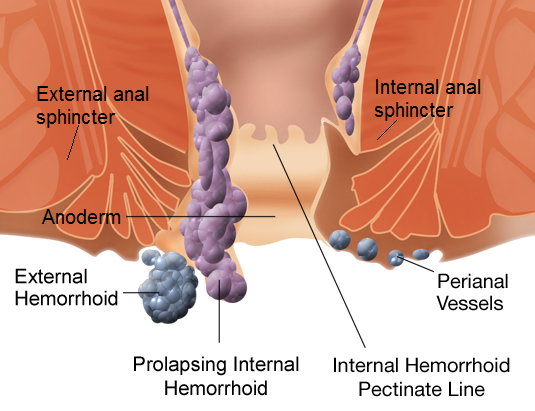| |


|
List
of Diseases > Hemorrhoids (Piles)
.jpg) Hemorrhoids
(Piles) overview Hemorrhoids
(Piles) overview
Largely resulting from a sedentary lifestyle, Hemorrhoids
(commonly known as piles) are swollen and inflamed veins
(blood vessels) in the anus and lower rectum. Hemorrhoids
is one the most common conditions affecting the digestive
system and is largely under-reported at clinic level since
many patients give trial to a lot of home remedies before
visiting their doctor.
An estimated 40% of people globally suffer from Hemorrhoids (piles) and by the age of 50 years, almost half of them have had at least one episode of bleeding with stools, itching of the anus, pain in anal region, etc. Men and women are equally affected by Hemorrhoids and the condition tends to get common with advancing age attaining the peak between 45 to 65 years of age.
Homeopathy has effective treatment for piles (Hemorrhoids)
especially for cases which are in the early stages. For
advanced stages of piles, homeopathy can only provide symptomatic
relief to the patients. We have treated a large number of
cases of Hemorrhoids with good results and have provided
significant relief from this condition to many. It is strongly
suggested that patients opt for Homeopathy treatment of
Hemorrhoids in the early stages itself to avoid further
progress of the condition.
What are hemorrhoids / piles?
When veins (blood vessels) in the anal region enlarge and form a mass, the condition is called as Hemorrhoids (piles). This mass (piles) may protrude outside the anus, may bleed, itch or even become tender.
Hemorrhoids are fairly common and the incidence ten ds
to increase with advancing age. People between 45 to 65
years of age have the highest incidence. However, many cases
go unreported since home remedies are very commonly used
to treat Hemorrhoids. ds
to increase with advancing age. People between 45 to 65
years of age have the highest incidence. However, many cases
go unreported since home remedies are very commonly used
to treat Hemorrhoids.
There are two types of Hemorrhoids:
- Internal: Internal Hemorrhoids originate in the upper part of the anal canal and usually you can't see or feel these hemorrhoids. They generally don’t cause any discomfort either; however, the patient continues to experience symptoms like bleeding with stools. Sometimes, the internal piles may prolapse (fall out of place) due to excessive straining and start protruding outside the anus resulting in pain and irritation.
- External: External hemorrhoids originate in the lower part of the anal canal and are covered by anal skin. When irritated, external hemorrhoids can itch or bleed. Sometimes blood may pool in an external hemorrhoid and form a clot (thrombus), resulting in severe pain, swelling and inflammation.
Based on the severity, hemorrhoids (piles) can be grouped as follows:
- Grade 1 Hemorrhoids: In this case, small swellings are present on the inside lining of the anus and cannot be seen or felt from outside. Their presence is only identified due to the bleeding which occurs with stools.
- Grade 2 Hemorrhoids: These hemorrhoids prolapse from the anus while passing stools but they immediately get pulled in to the original place after passing stools.
- Grade 3 Hemorrhoids: Here, the hemorrhoids remain outside the anus as small grape-like lumps but can be restored back (pushed) inside the anus using a finger.
- Grade 4 Hemorrhoids: These hemorrhoids permanently prolapse outside the anus and cannot be pushed back inside. These can result in significant discomfort to the patient.
Homeopathy can effectively treat grade 1 and grade 2 Hemorrhoids whereas it can provide symptomatic relief to grade 3 and 4 Hemorrhoids.
Causes of hemorrhoids
There are a number of factors which together contribute to the development of piles (hemorrhoids). The common causes have been described here:
- Chronic or frequent constipation leading to repeated straining during a bowel movement
- Poor eating habits (diet low in fiber, irregular meals) can worsen constipation thereby aggravating Hemorrhoids
- Sedentary lifestyle, occupations demanding frequent long distance driving
- Obesity can worsen Hemorrhoids
- Increased pressure on veins in the pelvic area during pregnancy can also lead to Hemorrhoids. In addition, straining to push the baby out during labor can make piles worse
- Anal intercourse
- Hereditary tendency
- Some patients may become anemic due to regular loss of blood on account of Hemorrhoids resulting in dizziness, fainting, weakness, etc.
Piles (hemorrhoids) are more likely to occur with increasing age because the tissues that support the veins in your rectum and anus can weaken with aging.
Symptoms of hemorrhoids
Though a large number of people develop hemorrhoids (piles), not all of them experience symptoms since the condition may be mild or asymptomatic in many cases.
The common symptoms of Hemorrhoids include:
- Painless bright red bleeding during bowel movements - you might notice small amounts of bright red blood on your toilet tissue or in the toilet bowl
- Lumpy mass protruding from anus
- Itching or irritation in the anal region, pain or discomfort
- Swelling around the anus
- A sensitive or painful lump near the anus (thrombosed piles due to formation of clot - it is generally hard as well)
The symptoms of hemorrhoids (piles) may overlap with certain other conditions such as anal fissure, fistula, peri-anal abscess, etc. and these may be misdiagnosed as Hemorrhoids. A proper examination can detect the cause of these symptoms.
The symptoms of Hemorrhoids and examination findings together are generally enough to conclude the diagnosis of Hemorrhoids in most cases. An internal examination using a proctoscope allows the doctor to visualize the anal canal. Though sigmoidoscopy has no role in diagnosing piles (hemorrhoids), this is done as a precaution in every patient with bleeding from the rectum to rule out any cancerous growths.
Homeopathy treatment
Homeopathy medicines can effectively help in management
of Hemorrhoids (piles ) and the symptoms associated with
it such as pain, bleeding, itching, etc. Homeopathic medication
targets the cause and thus treats the disease from the roots
thereby reducing the chances of relapse of the condition.
We have treated a large number of cases of Hemorrhoids with
good results and have given significant relief to patients
in most cases.
Conventional treatment for Hemorrhoids largely includes surgery or other procedures such as infrared coagulation, sclerotherapy, etc. However, the condition has a tendency to recur back after such treatments since they do not target the root cause. Homeopathic medicines, on the other hand, work at the root level and treat the underlying cause such as chronic constipation, laxity of veins, etc. If there is an underlying genetic tendency to develop piles, even that can be taken care of with properly planned constitutional treatment along with dietary and lifestyle modification.
Different cases have different scope of improvement with homeopathy treatment. Grade 1 and 2 of piles (hemorrhoids) can be effectively treated with Homeopathy. In cases of grade 3 and 4, medication can only help in providing symptomatic relief and cure may not be possible. However, the time duration of the treatment as well as results may vary from case to case.
It is suggested that patients opt for a well-planned constitutional treatment in the early stages itself so as to avoid further progress of the hemorrhoids and to ensure good results.
Self-care for hemorrhoids
Self care is just as important as proper medication when it comes to treating piles (hemorrhoids). Few changes in diet and lifestyle have to be adopted by the patients in order to ensure quick recovery from piles (Hemorrhoids). In cases where cure is not possible, adopting these measures can surely help in reducing the distress of the patients.
Based on our experience of treating a large number of cases
of Hemorrhoids (piles) ,we have found some clinically verified
tips to be very useful in patients:
- High fiber diet: This increases the bulk of stool facilitating easy bowel movement and hence it provides relief from hemorrhoids
- Fruits like apples, bananas, raisins, guavas, oranges pears, kiwi, dates etc. are high in fiber and can be taken generously
- You may consume fiber-rich foods like whole grains like wheat, barley, oats, rye, bran, whole meal pasta, brown rice; vegetables like broccoli, cabbage, eggplant; pulses like beans, lentils and peas, etc.
- Increased water/ other fluids intake: This helps in softening the stools and reduces straining effort required
- Exercise regularly in moderation
- Keep the anal area clean; after a warm bath dry it gently
- Instead of using dry toilet paper, use wet, non-perfumed tissues to clean the anal area
- Sit in a tub filled with warm water for few minutes everyday
- In case of swelling in the anal region, apply ice-pack for some time frequently.
|
|